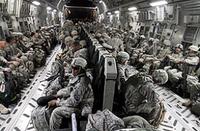-
Growing U.S. concern over North Korean miscalculation
U.S. officials are increasingly concerned with the escalating tensions on the Korean Peninsula and the risk of miscalculation. The fear is that North Korea’s young leader, Kin Jong Un, may have launched the harsh rhetorical campaign against South Korea and the United States for domestic reasons – especially the need to establish his leadership credentials in the eyes of the skeptical North Korean military – but that his youth and inexperience may lead him to over-play his hand. “He is 28, 29 years old, and he keeps going further and further out, and I don’t know if he can get himself back in,” Rep. Peter King (R-New York), former chairman of the House Homeland Security Committee, said.
-
-
Aryan Brotherhood suspected in Texas prosecutors killings

The FBI and other law enforcement agencies believe the white supremacist group the Aryan Brotherhood could be behind the murders of a Texas district attorney and his wife last weekend, and the death of an assistant district attorney earlier this year.
-
-
Pervasive surveillance threatens privacy, gives power advantage to the watcher

Surveillance is everywhere, from street corner cameras to the subject of books and movies. A researcher says that pervasive surveillance menaces our intellectual privacy and it gives the watcher a power advantage over the watched, which can be used for blackmail, persuasion, or discrimination.
-
-
Arab Spring protests an isolated occurrence, not new Arab world trend

As the long-term impact of the Arab Spring continues to take shape, researchers warn that the protests that swept across the Middle East and North Africa could mark more of an isolated occurrence than a permanent rise of people power in the region.
-
-
Engineers educate lawmakers about aging U.S. infrastructure

Two hundred members of the American Society of Civil Engineering (ASCE) fanned out across Capitol Hill last month for the annual Legislative Fly-In with a message: U.S. infrastructure problems are solvable if we have strong leadership in Congress. The ASCE members highlighted the nation’s need to eliminate the backlog of infrastructure deficiencies, modernize roads, bridges, water systems, and energy grid – and reminded Congress that to promote commerce and protect public safety, welfare, and the environment, infrastructure investment is a priority issue.
-
-
U.S. deploys F-22 stealth fighters to South Korea
As tensions on the Korean Peninsula intensify, and North Korea’s belligerent threats multiply, sources inside the administration said that the United States has deployed F-22 stealth fighter jets to South Korea to take part in large-scale military drills.
-
-
FBI wants 1994 online surveillance law updated
The FBI said the agency’s top priority this year is to update a surveillance law so authorities can monitor in real time Web activities of Americans suspected of committing crimes. The 1994 law, known as the Communications Assistance for Law Enforcement Act (CALEA), applies to telecommunication companies, but only partially to Web-based companies.
-
-
Cost to U.S. of Iraq, Afghanistan wars to exceed $4 trillion

A new study from Harvard University, calculating the cost to the United States of the wars in Iraq Afghanistan, has concluded that that cost will come to between $4 trillion to $6 trillion. This cost includes the spending on medical care for wounded soldiers and repairs to and replacement of military gear used in the two wars. The decision by the Bush administration to pay for the wars with borrowed money has increased their costs, the study says. In all, the two wars have added $2 trillion to the U.S. debt, accounting for about 20 percent of the debt incurred from 2001 to 2012.
-
-
Immigration violators spend long stretches in Washington jail
The Immigration and Customs Enforcement (ICE) can place holds on people booked into jail who may be in the United States illegally. A study of King County, Washington, jail data from 2011 found that about one in eight people with ICE holds were not charged with any crime. It also found that half of the inmates with holds were charged with misdemeanor crimes, including driving without a license. Moreover, if ICE has placed a hold on an individual in the King county jail, that individual will stay in jail an extra month on average. King county officials says all this costs the county too much money, and they want ICE to limit its holds for those who committed serious crimes.
-
-
Bipartisan Group of Eight to unveil immigration reform bill in early April
The bipartisan group of senators known as the Group of Eight, currently finalizing the details of a sweeping immigration bill, said on Wednesday that they will be ready to unveil their plan to Congress when it gets back to work in April. Four of the senators visited the U.S.-Mexico border to observe security operations along the border first hand.
-
-
U.S. to cut mineral payment to states by $110 million between now and August
The U.S. Department of Interior will cut its federal mineral payments to thirty-five states by $110 million due to the federal budget cuts. Different states will lose different amounts of money: Wyoming tops the list with $53 million in lost federal mineral payments over the next five months, while North Carolina is bringing up the rear, with the federal government cutting its mineral payments to the state by $7 (seven dollars) between now and August.
-
-
UN says 11,000 peace-keepers needed to stabilize Mali
UN secretary-general Ban Ki-moon said that about 11,000 peacekeepers may be required to keep the peace in Mali. He also said that a second, smaller force may be needed to conduct operations against Islamic terrorists in north Mali to prevent them from disrupting the country’s reconstruction.
-
-
El Paso to hire more border officers to compensate for CBP budget cuts
In El Paso, Texas, more than 100,000 residents depend on the activity across the bridges which connect the United States to Mexico. This includes $80 billion in trade a year that crosses the El Paso bridges and millions of shoppers who cross our bridges who spend more than $1.4 billion in the El Paso economy. Sequestration-related cuts, by promising longer wait times at border crossings, will hurt the local economy, and the El Paso city council is looking for ways to minimize the damage.
-
-
Draft cybersecurity bill to increase penalties for hacking substantially
A draft of a cybersecurity bill circulating among House Judiciary Committee members would strengthen a computer hacking law. The draft would stiffen penalties for cyber crimes and establish a standard for companies to tell consumers when their personal information has been hacked. The bill would also change an existing law, making a cyber crime attempt punishable as an actual offense.
-
-
ICE agents tell senators to go slow on in immigration reform
Chris Crane, the head of the union representing Immigration and Customs Enforcement (ICE) agents, has asked the bipartisan group of senators, known as the Gang of 8, which is working on immigration reform to allow ICE agents to offer their input.
-
More headlines
The long view
Preventing Another 'Jan. 6' Starts by Changing How Elections Are Certified, Experts Say
The 2024 presidential election may be a rematch between President Joe Biden and former President Donald Trump, but preventing a repeat of Jan. 6, 2021 — when false claims of a stolen election promoted by Donald Trump and his allies led to an insurrection at the U.S. Capitol —will be top of mind this election year. Research finds broad support among public for nonpartisan certification commissions.
States Rush to Combat AI Threat to Elections
This year’s presidential election will be the first since generative AI became widely available. That’s raising fears that millions of voters could be deceived by a barrage of political deepfakes. Congress has done little to address the issue, but states are moving aggressively to respond — though questions remain about how effective any new measures to combat AI-created disinformation will be.
Chinese Government Hackers Targeted Critics of China, U.S. Businesses and Politicians
An indictment was unsealed Monday charging seven nationals of the People’s Republic of China (PRC) with conspiracy to commit computer intrusions and conspiracy to commit wire fraud for their involvement in a PRC-based hacking group that spent approximately 14 years targeting U.S. and foreign critics, businesses, and political officials in furtherance of the PRC’s economic espionage and foreign intelligence objectives.
European Arms Imports Nearly Double, U.S. and French Exports Rise, and Russian Exports Fall Sharply
States in Europe almost doubled their imports of major arms (+94 per cent) between 2014–18 and 2019–23. The United States increased its arms exports by 17 per cent between 2014–18 and 2019–23, while Russia’s arms exports halved. Russia was for the first time the third largest arms exporter, falling just behind France.
LNG Exports Have Had No Impact on Domestic Energy Costs: Analysis
U.S. liquified natural gas (LNG) exports have not had any sustained and significant direct impact on U.S. natural gas prices and have, in fact, spurred production and productivity gains, which contribute to downward pressure on domestic prices.
Don’t Buy Moscow’s Shameless Campaign Tying Biden to Its Terrorist Attack
Russia has offered many different explanations to the ISIS-K’s 22 March 2024 terrorist attack at the Crocus City Hall in Moscow, but the most recent explanation offered by Russia is the most audacious yet: Russia now charges that the Ukrainian energy company Burisma financed the attack. Burisma is at the center of an effort by a congressional committee to impeach President Biden, but the case has all but collapsed. Hunter Stoll writes that Russia’s disinformation and propaganda apparatus appears to be searching for ways to keep Burisma in the news ahead of the U.S. presidential election.
